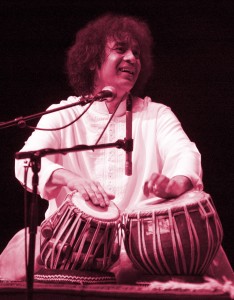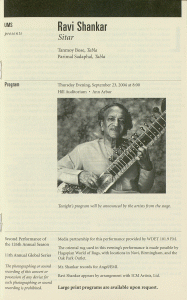This Day in UMS: Ravi Shankar
Editor’s Note: “This day in UMS History” is an occasional series of vignettes drawn from UMS’s historical archive. If you have a personal story or particular memory from attending the performance featured here, we’d love to hear from you in the comments.
December 11: Anniversary of Ravi Shankar’s Death
Legendary virtuoso sitarist, composer, teacher, and writer, Ravi Shankar was India’s most esteemed musical Ambassador and a singular phenomenon in the classical music worlds of both East and West. A prolific composer, he composed numerous traditional ragas and talas, as well as many works involving western collaborations, including two concertos for sitar and orchestra for violinist Yehudi Mehunin and collaboration with Philip Glass, including the multi-artist work Orion, which opened the 2004 Cultural Olympiad in Greece. The New York Times called him the “Sitarist who introduced Indian Music to the West.”
UMS first had the honor of presenting Ravi Shankar in April 1996 in Rackham Auditorium. The program pictured above is from a solo performance in Hill Auditorium in September 2004.
[LISTENING GUIDE] Improvised Classical Indian Music – Zakir Hussain & Masters of Percussion
Editor’s Note: UMS is presenting Zakir Hussain & Masters of Percussion on Thursday April 12th. Zakir Hussain is the pre-eminent classical tabla virtuoso of our time. Masters of Percussion, an outgrowth of Hussain’s memorable tours with his father, the legendary Ustad Allarakha, has enjoyed successful tours in the West since 1996.
 While there is a set program for this concert, no two performances of Indian classical music are ever the same. Zakir Hussain explains, “The thing about Indian art is that it’s based in improvisation. You take an idea and then you expand it in a spontaneous manner. It’s difficult to tie it down to ‘Okay, so many things will happen’, because you never know what idea will emerge, and what that would lead to, and where it will go. But the fact is that the musicians who are on stage are the best in their genre. They are considered great masters where they come from. So one thing that is for sure is that the music will be of very high quality.”
While there is a set program for this concert, no two performances of Indian classical music are ever the same. Zakir Hussain explains, “The thing about Indian art is that it’s based in improvisation. You take an idea and then you expand it in a spontaneous manner. It’s difficult to tie it down to ‘Okay, so many things will happen’, because you never know what idea will emerge, and what that would lead to, and where it will go. But the fact is that the musicians who are on stage are the best in their genre. They are considered great masters where they come from. So one thing that is for sure is that the music will be of very high quality.”
The following listening guide, curated by Meeta Banjerlee, provides an overview of Indian classical music and is a good representation of the style of music that will be played at the upcoming performance.
Pandit Hariprasad Chaurasia: Deepchandi (Bansuri):
Ustad Zakir Hussain: The Great Indian Desert (Tabla)
Pandit Ravi Shankar & Philip Glass: Passages (Sitar and Orchestra)
http://youtu.be/ugIbmTKrcHc
Pandit Ravi Shankar: Rag Rasia (Sitar)
Ustad Shahid Parvez: Dhun Bhairavi (Sitar)
http://youtu.be/8t5Gm1ewRQA
Pandit Nikhil Banerjee: Raga Malkauns (Sitar)
http://youtu.be/Ldfk_2yk7AA
Pandit Ram Narayan: Raag Jogiya (Sarangi)
Pandit Ram Narayan: Raag Darbari (Sarangi)
Ustad Amjad Ali Khan: Raga Bahar (Sarod)
Ustad Rashid Khan: Thumri (Vocal)
— Meeta Banerjee began learning the sitar at the Detroit Institute for Indian Music in 1989. She has performed all over Michigan in venues such as the Detroit Institute of Arts, Ann Arbor Book Festival, and the North American Bengali Conference. In 2005, she was invited as a featured artist for the Michigan Pops Orchestra’s “Pops Around the World.” She is a member of the local Indian fusion music group Sumkali and is a University of Michigan alum.



